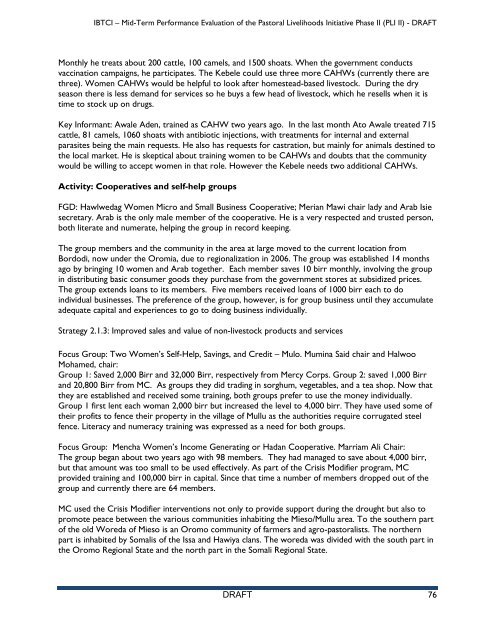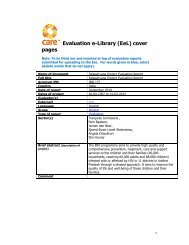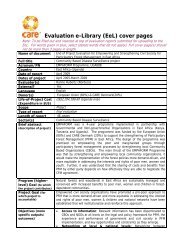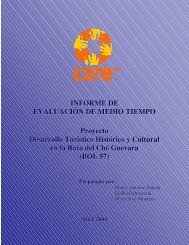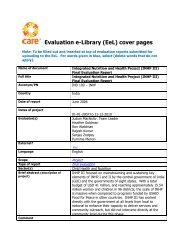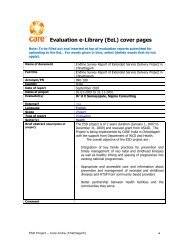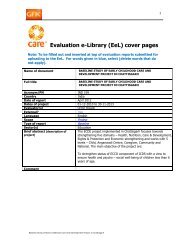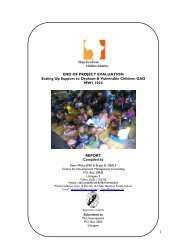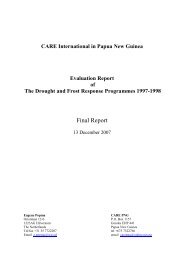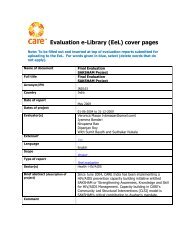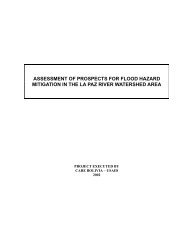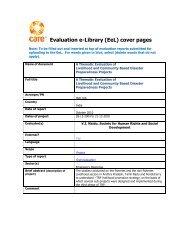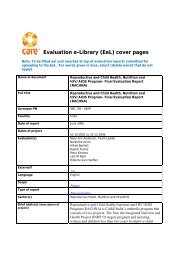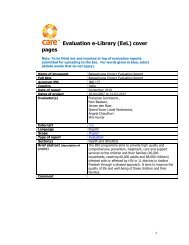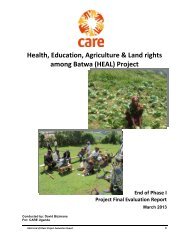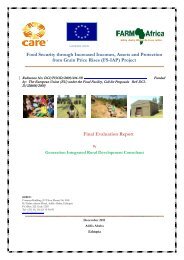Mid Term EVALUATION PLI II project - CARE International's ...
Mid Term EVALUATION PLI II project - CARE International's ...
Mid Term EVALUATION PLI II project - CARE International's ...
Create successful ePaper yourself
Turn your PDF publications into a flip-book with our unique Google optimized e-Paper software.
IBTCI – <strong>Mid</strong>-<strong>Term</strong> Performance Evaluation of the Pastoral Livelihoods Initiative Phase <strong>II</strong> (<strong>PLI</strong> <strong>II</strong>) - DRAFT<br />
Monthly he treats about 200 cattle, 100 camels, and 1500 shoats. When the government conducts<br />
vaccination campaigns, he participates. The Kebele could use three more CAHWs (currently there are<br />
three). Women CAHWs would be helpful to look after homestead-based livestock. During the dry<br />
season there is less demand for services so he buys a few head of livestock, which he resells when it is<br />
time to stock up on drugs.<br />
Key Informant: Awale Aden, trained as CAHW two years ago. In the last month Ato Awale treated 715<br />
cattle, 81 camels, 1060 shoats with antibiotic injections, with treatments for internal and external<br />
parasites being the main requests. He also has requests for castration, but mainly for animals destined to<br />
the local market. He is skeptical about training women to be CAHWs and doubts that the community<br />
would be willing to accept women in that role. However the Kebele needs two additional CAHWs.<br />
Activity: Cooperatives and self-help groups<br />
FGD: Hawlwedag Women Micro and Small Business Cooperative; Merian Mawi chair lady and Arab Isie<br />
secretary. Arab is the only male member of the cooperative. He is a very respected and trusted person,<br />
both literate and numerate, helping the group in record keeping.<br />
The group members and the community in the area at large moved to the current location from<br />
Bordodi, now under the Oromia, due to regionalization in 2006. The group was established 14 months<br />
ago by bringing 10 women and Arab together. Each member saves 10 birr monthly, involving the group<br />
in distributing basic consumer goods they purchase from the government stores at subsidized prices.<br />
The group extends loans to its members. Five members received loans of 1000 birr each to do<br />
individual businesses. The preference of the group, however, is for group business until they accumulate<br />
adequate capital and experiences to go to doing business individually.<br />
Strategy 2.1.3: Improved sales and value of non-livestock products and services<br />
Focus Group: Two Women’s Self-Help, Savings, and Credit – Mulo. Mumina Said chair and Halwoo<br />
Mohamed, chair:<br />
Group 1: Saved 2,000 Birr and 32,000 Birr, respectively from Mercy Corps. Group 2: saved 1,000 Birr<br />
and 20,800 Birr from MC. As groups they did trading in sorghum, vegetables, and a tea shop. Now that<br />
they are established and received some training, both groups prefer to use the money individually.<br />
Group 1 first lent each woman 2,000 birr but increased the level to 4,000 birr. They have used some of<br />
their profits to fence their property in the village of Mullu as the authorities require corrugated steel<br />
fence. Literacy and numeracy training was expressed as a need for both groups.<br />
Focus Group: Mencha Women’s Income Generating or Hadan Cooperative. Marriam Ali Chair:<br />
The group began about two years ago with 98 members. They had managed to save about 4,000 birr,<br />
but that amount was too small to be used effectively. As part of the Crisis Modifier program, MC<br />
provided training and 100,000 birr in capital. Since that time a number of members dropped out of the<br />
group and currently there are 64 members.<br />
MC used the Crisis Modifier interventions not only to provide support during the drought but also to<br />
promote peace between the various communities inhabiting the Mieso/Mullu area. To the southern part<br />
of the old Woreda of Mieso is an Oromo community of farmers and agro-pastoralists. The northern<br />
part is inhabited by Somalis of the Issa and Hawiya clans. The woreda was divided with the south part in<br />
the Oromo Regional State and the north part in the Somali Regional State.<br />
DRAFT 76


